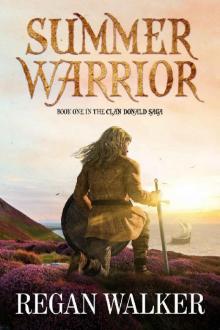- Home
- Regan Walker
Summer Warrior (The Clan Donald Saga Book 1) Page 2
Summer Warrior (The Clan Donald Saga Book 1) Read online
Page 2
“Tell us,” said a burly man behind Angus. “We will meet it.”
“If you can catch the large salmon that has escaped my spear these past many days, I will consider your request.” Like Naaman in the Bible, asked by God’s prophet to do something he considered ridiculous to cure his leprosy, the MacInnes men grew angry, grumbling among themselves.
Somerled recalled that when Naaman finally succumbed to the pleading of a servant girl to do as the prophet asked and wash in the river Jordan seven times, he was cured. Mayhap if these prideful men, who thought this request beneath them, would agree, they might accept without question his orders to follow.
“That is hardly a challenge for a warrior!” growled a harsh-looking man, one whose face was red with anger.
“Yet the fish has eluded me,” said Somerled with a wry smile. “Only best me at this task and I will look favorably upon your request that I should lead the clans against the Norse.”
“Very well,” said the one who had spurned the challenge. Raising his spear, he stepped into the dark waters up to his knees and waited. The men on the shore watched in silence as the salmon swam around before diving deep as if teasing them.
Then, suddenly, the salmon rose to the surface of the dark waters and the MacInnes warrior struck fast, his spear a blur. After some struggle by the powerful fish, with a broad smile, out of the water the MacInnes man pulled the largest salmon Somerled had ever seen—more than two feet in length. “A good omen,” pronounced the MacInnes man.
“It seems God has favored your request,” said Somerled. “Come, let us dine on the fish and discuss this cause of ours.”
Angus let out a huge sigh as the men trudged back to Somerled’s camp, startling a flock of crows that had settled into the branches above them. “I might have known you’d have them seek a sign, Brother.”
Somerled laughed, batting away the midges that swarmed about his face. “Or, mayhap I am merely hungry for a salmon dinner.”
CHAPTER 2
Castle Rushen, Isle of Man
RAGNHILD ALWAYS BELIEVED she was safe behind the stone walls of her father’s castle but no longer. With her stepmother determined to be rid of her and Orkneymen lounging in her father’s great hall, she felt on shaky ground. Seeking to avoid them, she occupied herself with directing the servants preparing the evening meal. Now summoned by her father, she could no longer avoid what the evening portended.
Quietly, she came through the door to the great hall and paused when she heard Earl Rognvald’s deep voice reciting yet another of his tiresome poems.
In appearance, the earl made a vivid impression, for he took pains with his person. No fold of his tunic out of place, no hair of his chestnut head allowed to separate itself from the others to fly about his face. Arrogant and bold, his dark eyes gleamed as he spoke.
At nine skills I challenge—
A champion at chess:
Runes I rarely spoil,
I read books and write:
I’m skilled at skiing
And shooting and sculling
And more!—I’ve mastered
Music and verse.
To that, his kinsmen lifted their tankards and cheered, “Rognvald! Rognvald!”
Disturbed from their sleep where they lay by the hearth fire, the deerhounds that had been a gift to her father from the Lord of Galloway, raised their heads, suddenly alert.
Ragnhild silently uttered an oath and went to the hounds, whispering assurances to them as she stroked their narrow heads. ’Twas a truth that the Lord of Orkney liked to hear his own voice. His pride might be understandable for he was accomplished at many things, yet to recite his skills for all to hear made him appear the braggart.
He had accepted the Christian faith, as had the Norwegian king, and attended Mass these past several days at Rushen Abbey, but he still sought knowledge in the pagan runes, boasting of his power to read them. How could God honor such a man?
She was convinced Rognvald could not imagine anyone else as the Earl of Orkney save himself. Even murder had not been beneath him to gain the title the King of Norway wanted him to share with Earl Paul. He might not have done the deed himself. Though, if the rumors be true, Rognvald had a hand in it.
The earl and his Orkneymen had lingered on Man for nearly a week, taking advantage of her father’s hospitality. She had not been privy to all of his conversations with her father so she could not discern his entire purpose. Mayhap they spoke of the alliance that had been in place since before Ragnhild’s birth.
The King of Man and the Isles was favored by all, including the English, Irish and Scots. An alliance often involved a marriage between two families to make fast a bond. Her dowry would be a rich one and the Earl of Orkney would want sons. But if he thought to take her with him when his dragonships sailed north, he was mistaken. She had made her dislike of him known to her father. Surely Olaf would not force her to go.
Affraic, her father’s wife, gowned in pale gray silk that did nothing for her black hair and colorless eyes, sidled up to Ragnhild. “You should draw near to Earl Rognvald and smile,” Affraic whispered. “Your admiration would greatly encourage him.”
The daughter of Fergus, Lord of Galloway, and one of King Henry’s illegitimate daughters, Affraic considered herself above Ragnhild. The marriage of Affraic to Olaf made both men happy but it had changed Ragnhild’s life.
“As I would fear,” said Ragnhild with a frown, “which is why I’ll not do it. The earl has enough admirers among his men. I would not become another.”
At one end of the hall, a raised dais would welcome the royal family for dinner but, now, it was empty as her father and Earl Rognvald and his men sat at one of the trestle tables that stretched out before the raised platform.
Affraic’s face twisted in a pained expression as she spat out, “You are the Princess of Man, Ragnhild! You have a duty to wed according to the king’s will.”
“Yet the king’s will may change,” said Ragnhild. It was her fervent hope.
“Too long you have run free,” she hissed. “Marriage is honorable and expected but you will never find a husband harboring such an attitude.”
“Mayhap not.” Ragnhild raised a skeptical brow. “Did I say I wanted one?”
“Ah, Princess!” The Earl of Orkney, having spotted her, interrupted his recitation. “Come here and I will favor you with a poem. An ode to your beauty.”
With a groan, Ragnhild stepped out of the shadows. Did he think she was vain? She wanted to ask but, instead, to honor her father, she dipped her head and said, “You are too kind, my lord.” She came forward and took refuge at her father’s side where he sat enjoying his ale at the end of the table.
Rognvald began another poem, his intense dark eyes never leaving her. His voice faded as she shifted her gaze to the men of Orkney sitting around him held in rapt attention. They were all mail-clad warriors, long-haired and bearded, battle ready with swords and great gleaming axes hanging from their belts. Had they been the ones to murder Earl Paul? Had they pillaged as they sailed south, leaving cottages burning in Argyll and the Isles? One named Sweyn, when drinking deeply, had boasted of his battles and the women who satisfied his lust.
Rognvald’s booming voice drew her attention to where he stood. Not as tall as some of his men but well-proportioned and strong-limbed, his chestnut hair fell in waves to his shoulders. Even before his arrival she had heard he was a man who gave great attention to his person and his clothing.
In her father’s great hall, where the rushes were herb-scented and always fresh, where tapestries hung on the stone walls that spoke of the Kings of Man, Earl Rognvald wore his finery, bright with color and the fabrics rich fabric. His mantles of fine woolens were clasped with gold brooches carved with Norse symbols. She suspected that was not what he wore beneath his mail when he engaged in battle, which, by all accounts, had been often.
She knew from her mother that Orkney’s history was one of petty grievances, feuds and warring factio
ns. The stories often involved betrayal and murder, of cousins, friends, even brothers. She wanted no part of it.
OLAF PATTED his daughter’s hand as her fingers rested on his shoulder as she sighed beneath the weight of Rognvald’s many words. The tension she conveyed in her touch was uncharacteristic of his fearless, spirited daughter. Mayhap it was the grin the earl gave her as he spoke of her beauty, one that hinted of possession and nights under the furs. Olaf could see the earl was pleased with the possibility of having her to wife. Any man would be. The flame-haired Princess of Man had grown into an emerald-eyed enchantress, beautiful and keenly intelligent, but one who was slow to accept another’s will, even Olaf’s own.
Still, he needed this alliance.
The Norse sea-raiders gave little heed to anything save their own pleasure and lust for wealth. Word had reached Olaf of their pillaging, raping and burning as they sailed south, coming ever closer to Man where great treasure lay. Olaf took comfort in his warriors and his many longships resting in the harbor but he feared a stealthy attack. A great force of Norse could overpower his men.
His marriage to Ingibiorg, Ragnhild’s mother, had brought peace for many years as the Earls of Orkney kept the villains at bay, but would this new earl observe the old alliance? Earl Paul, who had ruled Orkney before Rognvald, had been a man like Olaf, one who preferred peace to war, one who was loved by his people. Alas, he was gone, replaced by this capable, though pompous Norseman whose axe, dagger and sword spoke of battle. Could Olaf give his beloved daughter to such a one? Did he have a choice?
THE NEXT MORNING, Ragnhild lengthened her stride as she hurried toward the abbey her father had built several years before. She had to speak to Abbot Bernard, her confessor, counselor and closest friend. Not even her handmaiden, Cecily, was privy to the secrets she shared with the priest. When the Savignac abbot first came to the Isle of Man, she could speak Irish, Norse and English, but he had taught her to write as well. They had shared many hours by the fire as he read to her from ancient manuscripts and spoke about God, encouraging her to trust her future to the Master of the Heavens.
The priest met her at the door of the wooden abbey, wearing the gray robe of the Savignacs that was nearly the color of his tonsured hair and short beard. “What is it, child? You seem greatly disturbed.”
“Indeed, I am,” she confirmed. “Do you know who my father has been entertaining at the castle this past sennight?”
“’Tis known the Earl of Orkney visits the island.”
“Not just a visit. I think my father means to make a match between us! I cannot bear the thought of being wedded to a man so full of his own conceit.”
“Yet you are both Norse.”
She averted her gaze. “We are not the same. You know as well as I the King of Norway has little to say in the affairs of Man. Some of the Norse still hold to their pagan traditions while my father is a man of reason and learning, a man of God, closer to King Henry than Norway’s king.”
“Yea, ’tis true,” Abbot Bernard said, nodding. “We are ever in King Olaf’s debt for the land on which the abbey stands and the timber he gave us to build. And now he encourages us to build anew in stone and grants us more land.”
“I would dread having to leave my father to marry a man tied to Norway. I have no wish to live far away on those dreary islands with their harsh cliffs surrounded by sea. And I refuse to marry a murderer.”
The abbot’s forehead furrowed as if he were unaware of the rumors that had dogged Earl Rognvald. Surely the priest had heard of Earl Paul’s demise.
“Come, child, let us share some ale and we will speak more of it.”
As well as raising cattle and growing herbs and vegetables, the monks of the abbey produced excellent ale. Ragnhild was not averse to raising a goblet with her dear friend. “Very well,” she said, following him inside. “I am in sore need of your advice.”
In the monks’ dining hall, Abbot Bernard called for ale and, soon, Ragnhild was sipping the warm golden liquid and pouring out her heart.
His goblet held between his sure and steady hands, the priest stared into his ale. “It is common for lords to barter their daughters for alliances, Princess.”
Wishing he would raise his kind brown eyes to her where she hoped to see sympathy, she asked, “Is the situation so dire that King Olaf needs this alliance?”
“Aye, there is a need,” he said raising his head. “The Norse pirates are ranging farther south. Earl Rognvald could stop them if he chose.” Meeting her gaze, he said, “If it is you the earl desires, mayhap the sea-raiders serve his purpose to pressure your father into meeting his demand for your hand.”
“Oh.” She sat back, twisting her goblet in her hands, her fingers running over the raised carving. “I had not thought of that.” Nothing would bring her father to the negotiating table sooner than if his kingdom and the people of Man were threatened. “But what of his alliances with King Henry and King David, not to mention Lord Fergus of Galloway? Are they not protection enough?”
“They have served King Olaf well these many years. Like your father, David was raised in Henry’s court, a hostage really. Yet now Henry and David squabble over Cumbria. Their eyes are diverted from what is happening in the west. If there were another way to keep the Norse pirates from our shores, it is possible your father might delay an alliance with Earl Rognvald.”
“Is there another way?” she asked, looking into his wise face with anxious eyes.
He nodded sagely. “Aye, there might be. News spreads of a strong warrior driving the Norse menace from the shores of Argyll.”
Her heart raced to think of such a possibility. She looked at the abbot with hope in her eyes.
He rested his hand on hers. “Worry not. I will speak to the king.”
CHAPTER 3
The Village of Drimnin, Morvern, Argyll, late summer 1136 A.D.
SOMERLED SMELLED THE SMOKE before he reached the village.
A small community nestled around a crescent bay on the western shore of Morvern, everyone who lived in Drimnin was related either by blood or marriage. In the past, the villagers had made a good life raising cattle and reaping the bounty of the sea. Somerled had passed this way only once, and then he had approached from the Sound of Mull in his galley. He remembered the villagers’ humble but generous hospitality.
Today, he and his men had traveled on foot along the coast, wending their way through the pine woods in search of the Norse rumored to be raiding the shores of Morvern, hoping to catch them before they could strike. His ships were still too few to take them on the water.
He stepped out of the trees, lush with ferns at their base, his hand on his sword hilt, prepared to fight.
A ghastly sight met his eyes, sickening his stomach.
Too late.
Bodies were sprawled upon the grass between the shore and the woods, struck down while trying to flee. Dreadful wounds revealed some had fallen to axes.
Acrid smoke rose from the cottages still burning, the flames leaping from the dry thatched roofs. He could see no longships pulled up on shore but the raiders could not have been gone long.
Aghast at what he saw, he was suddenly aware there were no birds to be heard, save the hooded crows pecking at the blood-soaked bodies. “See if any live,” he said to Domnall and started forward.
“Aye,” said his cousin and swung his arm in silent command, pointing to the fallen. The men hastened to obey.
Both old and young had been killed by the merciless Norse. Seeing the women who had been violated, Somerled ground his teeth. Their tunics had been ripped from their bruised bodies before they were killed. “Cover them,” he said to one of his men. “Cover them all with whatever you can.” The men closest to him hurried to accomplish the task.
He walked through the village, assessing the carnage. The doors of the burning cottages stood open. Goods, taken in haste, had been discarded like so much rubbish. So, too, had the Norse raiders considered the lives of the people. He knew
they would see judgment in the next life but Somerled wanted justice in this life. He did not hate the Norse. How could he when his mother was one of them? But these were lesser men, ruthless pirates, some ostracized from their own people to prey on others.
When his men returned with reports that none lived, Somerled faced the woods and, in Gaelic, said in a gentle voice, “If you live, come to us or make a sound. We will help you.”
A moment passed and then two boys staggered out of the woods, their fearful expressions and tear-stained cheeks bearing witness to what they had seen. From the look of them, they were brothers, close in age, both with dark brown hair and wide eyes. To them, Somerled’s height and sun-gilded fair hair would mark him more Norse than Gael.
Kneeling before them, he said, “I am Somerled, a man of Argyll, and these are my men. You will be safe with us.” When he saw relief on their faces, he said, “We will return to bury the dead but now we must go in haste to exact vengeance on those who did this. Do you come with us?”
The boys shared a glance and the older one nodded. “We will come.” Somerled gave them into the care of a MacInnes man who stepped forward and offered to raise the boys with his own children.
As they started to go, the older one turned and said, “They took our sister and another girl.” It was clear from the boy’s haunted eyes he had an idea of the girls’ fate. Likely he had already witnessed the rape of the village women, including his own mother.
Somerled’s eyes narrowed as his heart hardened within his chest. “We will see them avenged.”
A short way down the coast, one of Somerled’s men scouting ahead had spotted dragonships offshore.
They approached the top of the rise and Somerled signaled his men to stay low. Yellow wildflowers bloomed where he crouched behind a boulder to observe the Norse longships.

 Summer Warrior (The Clan Donald Saga Book 1)
Summer Warrior (The Clan Donald Saga Book 1) Echo in the Wind
Echo in the Wind Once Upon a Christmas Past
Once Upon a Christmas Past A Secret Scottish Christmas (Agents of the Crown Book 4)
A Secret Scottish Christmas (Agents of the Crown Book 4) The Holly and the Thistle
The Holly and the Thistle Racing with the Wind (Agents of the Crown)
Racing with the Wind (Agents of the Crown) Wind Raven (Agents of the Crown)
Wind Raven (Agents of the Crown) Rebel Warrior (Medieval Warriors #3)
Rebel Warrior (Medieval Warriors #3) King's Knight (Medieval Warriors Book 4)
King's Knight (Medieval Warriors Book 4) The Twelfth Night Wager
The Twelfth Night Wager The Red Wolf's Prize
The Red Wolf's Prize The Shamrock & the Rose
The Shamrock & the Rose A Fierce Wind (Donet Trilogy Book 3)
A Fierce Wind (Donet Trilogy Book 3) Against the Wind (Agents of the Crown Book 2)
Against the Wind (Agents of the Crown Book 2)